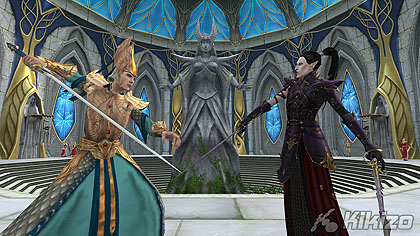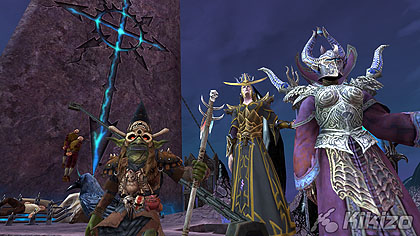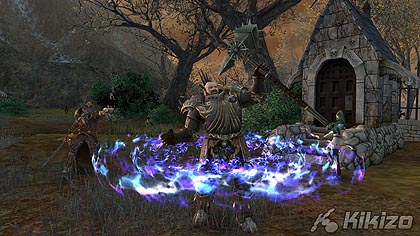Warhammer Age of Reckoning Interview
We stumble our way through a detailed, MMO-flavoured chat with EA Mythic veteran Josh Drescher.
Page 2
Kikizo: So each player's role is solely to destroy the opposing capital city? Or are there other objectives?
Drescher: Basically, all throughout the world we have the Player versus Environment experience and the Realm versus Realm experience, and they kind of run in parallel across most of the world, and they offer a back-and-forth assistance to one another. At the highest level when you get to this capital city, the interior area represents this massive boss encounter - a high level raid that players can go on only inside the capital city. And obviously to get into a capital city and fight the king, you have to have had an RvR conflict that basically brought that war to the front gates - erected siege engines, knocked down the wall, fought your way through the entire city and made that particular encounter available.
The flipside of that is the RvR players actually need the support of the PvE players. Everything you do in the game is part of the war effort, part of what we call the campaign, so while you're out doing quests, crafting, unlocking things in the Tome of Knowledge - all the things in the PvE side of the game - you're offering assistance to the RvR players, who are pushing closer and closer - if you're lucky - to the enemy gate, or - if you're not so lucky - trying desperately to repel the alien invasion.
Kikizo: At a more mundane, mechanical level, how do you keep all the different players and their aims cohesive?
Drescher: We have a mass-transit system that enables players to travel around the world rapidly. That's actually especially important in a game like this where we have multiple allied factions that are effectively on the same side, but start in different areas.
So if you want to play an Elf and I want to play a Dwarf, but we want to play together, there needs to be a way for us to get together easily without running across an entire continent. So one of our goals with that particular system was to make it as easy as possible for players to move around the world in a way that makes sense.
We don't want you having the ability to fly into an area that you don't belong in, or that would be far too dangerous for you, so you'll need to uncover them initially as part of that exploration experience. But over time you're going to be able to move around that world very easily, because we want you fighting not travelling.
Kikizo: Presumably cities are more than just trophies to be won or lost...
Drescher: Sure. This is where players come to do business; this is where the auction house is; this is where players come to train their characters; this is where players come to go on new quests, to buy things from vendors, to sell things to other players, to meet and form strategies as a Guild. You can go into the communal Guild Hall, and there's a separate facility above that Guild Hall for the Guild Leadership to go meet in, so they can form alliances, launch strategies, plan attacks and so forth. So it operates very much like a real city.
Kikizo: How does actually taking down an entire city work?
Drescher: I'll actually start from the opposite end - what you do to build a city. When the game begins... it's day one, we've just launched, you've come to Altdorf for the first time, it's going to be relatively run-down - dingy, trash in the streets. Not as many facilities are available, not as many things are in the world yet because players literally haven't earned them.
As an entire faction, as the thousands of players on each side interact with the different content in the world - going on quests, crafting, unlocking things from the Tome of Knowledge, playing against one another in RvR - they're actually also contributing to the prestige of their city.
So what that'll do is over time bigger and more impressive structures will become available - the Bright Wizard's Tower, for example, or the Temple of Sigmar, or the Imperial Palace. Those are all facilities that will become available over time.
And what'll happen is that to attack an enemy's capital city, you actually have to push that battlefront to that city initially, so there's a large quantity of combat that is involved. There's an ongoing battle to push that battlefront back and forth [and once] you've pushed it to the enemy's gates, you've erected siege engines, you've knocked down those front gates, you then have to come inside the city to fight your way through all the different content.
So say for example you wanted to fight the Emperor - to get to him you actually have to fight your way through every other part of the city. You have to destroy the Temple of Sigmar and wipe out the Sigmarite Warrior Priests that come from there. You have to destroy the Bright Wizard's Tower which is full of Pyromancers that offer artillery support. You have to kill a lot of the vendors, burn stores to the ground, rob people. And so as you progress through the city, that's mechanically how the invasion will operate.
But it will require hundreds of players operating in tandem strategically to even get to the capital city, then hundreds of players successfully invading the capital city, and then large groups of people in an organised way moving through different parts of the city, taking out different portions of it strategically, before you head in and attack the King.








 Satoru Iwata Video Interview - the late Nintendo president spoke with Kikizo in 2004 as 'Nintendo Revolution' loomed.
Satoru Iwata Video Interview - the late Nintendo president spoke with Kikizo in 2004 as 'Nintendo Revolution' loomed. Kaz Hirai Video Interview - the first of Kikizo's interviews with the man who went on to become global head of Sony.
Kaz Hirai Video Interview - the first of Kikizo's interviews with the man who went on to become global head of Sony. Ed Fries Video Interview - one of Xbox's founders discusses an epic journey from Excel to Xbox.
Ed Fries Video Interview - one of Xbox's founders discusses an epic journey from Excel to Xbox. Yu Suzuki, the Kikizo Interview - we spend time with one of gaming's most revered creators.
Yu Suzuki, the Kikizo Interview - we spend time with one of gaming's most revered creators. Tetris - The Making of an Icon: Alexey Pajitnov and Henk Rogers reveal the fascinating story behind Tetris
Tetris - The Making of an Icon: Alexey Pajitnov and Henk Rogers reveal the fascinating story behind Tetris Rare founders, Chris and Tim Stamper - their only interview? Genuinely 'rare' sit down with founders of the legendary studio.
Rare founders, Chris and Tim Stamper - their only interview? Genuinely 'rare' sit down with founders of the legendary studio. The History of First-Person Shooters - a retrospective, from Maze War to Modern Warfare
The History of First-Person Shooters - a retrospective, from Maze War to Modern Warfare